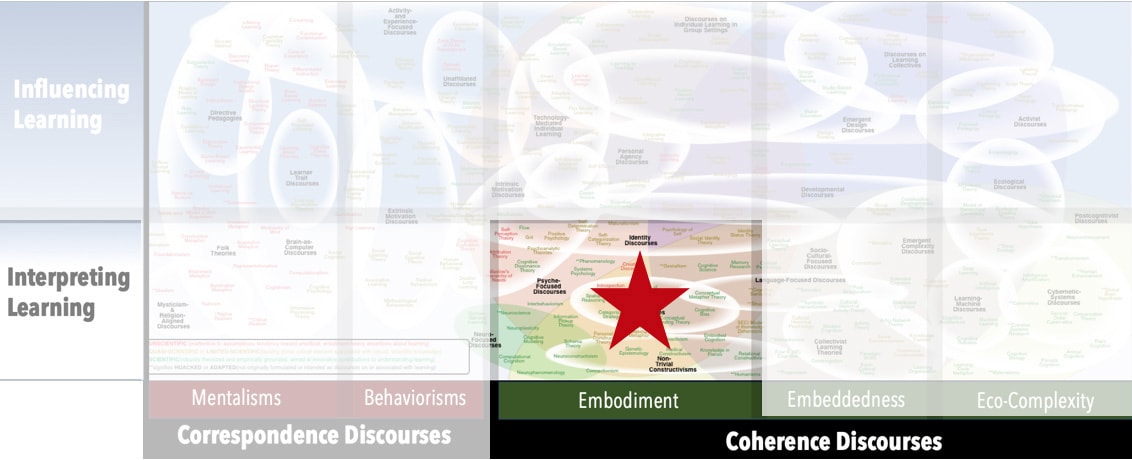AKA
Introspectionism
Focus
Role of self-awareness in learningPrincipal Metaphors
As detailed below, Introspection is not a theory of learning. However, introspective processes are invoked in many perspectives, especially Embodiment Discourses. Perhaps ironically, the metaphors most commonly invoked across the Introspection literature bear a strong resemblance to those associated with the Illumination Metaphor, whereby one’s mental state is interpreted as something seeable – that is, able to be watched/monitored and overseen/controlled:- Knowledge is … aspects of experience available to consciousness
- Knowing is … being self-aware
- Learner is … a self-analyst (individual)
- Learning is … analysis of the contents of consciousness
- Teaching is … N/A
Originated
1950sSynopsis
Introspection is the examination of one’s own mental states, which includes awareness sensory, bodily, cognitive, emotional, and other states. It is most often considered as a means of learning, operating alongside perception, reason, memory, and testimony. As such, it is usually encountered as an aspect of other theories (e.g., Reflective Practice, Metacognition) rather than being engaged as a theory itself. Associated constructs include:- Immediate Experience – the qualities of an object or event that are directly perceived
- Mediate Experience – one’s conscious awareness and interpretation of an object or event, which involves recalling information and layering on meanings that are not actually part of that object or event
Commentary
As a research method, Introspection has many limitations, which are most often linked to the unreliability of subjective reporting (rooted in, e.g., self-deception, distraction, suggestibility, outright lies, etc.), including the obvious fact that asking people about their states of mind will affect those states of mind. Introspection thus fell into disrepute many decades ago. Nevertheless, methods associated with Introspection are still widely used, under such names as self-report surveys, interviews, and think-aloud protocols. They are also foundational to several discourses, including the Reflective Practice, Phenomenology, and Metacognition.Authors and/or Prominent Influences
Wilhelm Wundt; Edward TitchenerStatus as a Theory of Learning
Introspection is not a theory of learning, and it is not purported to be one. Opinions vary dramatically on its utility in both research and education, but it has been utilized as a tool to investigate learning (e.g., in Phenomenology) and as a strategy to support learning (e.g., via Metacognition). Critically, proponents of Introspection rarely attend to its underlying metaphors.Status as a Theory of Teaching
Introspection is not a theory of teaching. Some perspectives with strong interests in affecting learning, such as Metacognition, have developed teaching emphases that make heavy use of introspective processes.Status as a Scientific Theory
Introspection does not meet the requirements of a scientific theory.Subdiscourses:
- Immediate Experience - Immediate Experience – the qualities of an object or event that are directly perceived
- Mediate Experience - Mediate Experience – one’s conscious awareness and interpretation of an object or event, which involves recalling information and layering on meanings that are not actually part of that object or event
Map Location

Please cite this article as:
Davis, B., & Francis, K. (2022). “Introspection” in Discourses on Learning in Education. https://learningdiscourses.com.
⇦ Back to Map
⇦ Back to List
